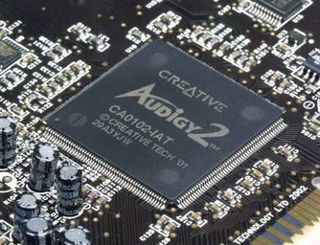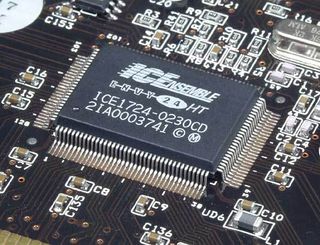High-End Audio: Creative and Terratec
Down To Basics

The Creative cards use the well-known Audigy 2 chipset, based on a powerful DSP (digital signal processor) operating at 32 bits and at a 48 kHz frequency. The chipset and related components are combined with 24 bit converters that are capable of reaching a frequency of 192 kHz in playback and 24 bits and 96 kHz in record mode.
There is a great amount of leeway in the cards' different features. While the Audigy 2 has "direct-to-disk" capabilities at 24 bits/96 kHz, the audio stream does not take advantage of DSP technology. Applying real-time effects is not possible.
One of the Creative cards also differs by the inclusion, on the Platinum, of a Sigmatel STAC9721T circuit (18 bits / 48 kHz), that handles the internal analog inputs on the PCI card.
The Platinum EX does not have this capability, so the PCI card has no analog inputs, and the audio streams are routed through the PCI bus. The upside is that a cable connecting the CD or DVD drives is not required, but the downside is that there is that connections to audio peripherals are limited.

The Terratec is based on a VIA Envy 24 HT chipset. The card's main feature is its high-quality playback. It supports 24 bits at up to a 192 kHz frequency, with a maximum of 8 output channels (7.1).
The downside is that it only offers two 24 bit input channels since it is not designed for multi-track recording applications. For the internal analog inputs on the card, Terratec uses an 18 bit Sigmatel STAC9744T functioning at 48 kHz.
The Envy 24HT does not offer many sound-processing options. It can, however, operate at a wide range of frequencies.
Stay on the Cutting Edge
Join the experts who read Tom's Hardware for the inside track on enthusiast PC tech news — and have for over 25 years. We'll send breaking news and in-depth reviews of CPUs, GPUs, AI, maker hardware and more straight to your inbox.
The concept of the Creative and Terratec cards is thus appreciably different. The Creative has a powerful integrated DSP but is limited to a sampling frequency of 48 kHz, which allows for the application of multiple real-time effects that are not relied on the capabilities of the main processor.
Terratec has adopted a non-DSP approach. Its effects instead relay on the PC's software and host CPU.
Current page: Down To Basics
Prev Page Introduction Next Page Creative Audigy 2, Audigy 2 Platinum & Platinum EX: Accessible ConnectionsMost Popular

